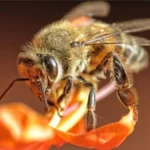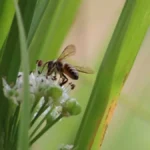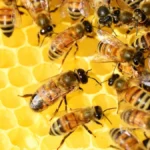We take a look at how to kill African bees. In some areas of the world, it is important to understand how to control Africanized honey bees. We take a look at a few simple methods to help you achieve this control.
What Is The African/Africanized Honeybee?
In an attempt to improve the bees of Brazil honeybee genetics from Southern Africa (Read Apis mellifera scutellata) were introduced. The bees in that area were introduced bees from Europe. The African bees were better adapted to the local conditions. They spread rapidly north over a few decades crossing through Mexico and into the southern US.
Africanized bees do not have the ability to form a proper winter cluster. Their further spread north is limited by temperature.

Moderate To Severe Aggression
African/Africanized bees have a shorter history of domestication than European honeybees. This means that there has been less selection for “good traits”. Bees that have had much less human selection for “good traits” tend to be more aggressive. Aggression is regarded as a bad trait.
In this regard, African bees tend to be a lot more aggressive than managed European bees. If you do not follow normal good beekeeping practices – smoker used correctly, and some common sense, Africanized bees will teach you memorable life lessons.
I have however worked with African and Africanized bees in short pants and slip slops (no shirt). With appropriate use of smoke and common sense, I was unstung. I have also worked bees in parts of the world with the “most peaceful European” bees and have been stung far from the hives. All bees take a bit of getting used to. Africanized bees are more easily riled up than others as a general rule. All bees can however get angry.
How To Catch African Bees
As a general rule, African bees produce more swarms than European bees. If you are in an area with some Africanized bees present, the chances are that in spring, the first swarms to start moving will be Africanized. Your local extension department should be able to help you identify if you have Africanized bees.
Placing bait boxes in trees and areas that bees will naturally look for nesting sites will allow you to trap swarms that are moving around. Again, the likelihood is that if you catch a swarm, it will more often than not be Africanized if you are in an area where these bees occur. The reason for this is that Africanized bees are more resistant to the diseases that plague European bees and hence multiply faster.
Bait boxes baited with a bit of beeswax, propolis and a lure such as a lemongrass oil drop or two are very effective at catching Africanized bees.
Learn more about: Lemongrass Oil For Honey Bees
How To Kill Africanized Bees
If you are a skilled beekeeper and have the right equipment this is relatively easy. Place the bait box in a plastic bag in the evening. Seal the bag. The bees will suffocate in a few minutes. If you want to be sure, place the bag in a freezer for a day. The bees will be dead.
If you are not a skilled beekeeper, call a pest exterminator. In most areas where Africanized bees occur there are exterminators who have the correct legal methods compliant with local laws to fumigate the bees.
How To Control Africanized Bees
In areas where Africanized bees are established, there will be many swarms during rainy warm periods. Limiting nesting sites will force the bees to move into designated bait boxes where they can be dealt with.
Africanized bees are less selective about nesting sites. They will nest in old car wrecks, dog kennels, upturned flower pots, compost makers, lawnmower hoppers, and many other places. Limiting the number of places available for them to nest, and then providing trap/catch boxes in the best places will direct them to these trap boxes.
I personally believe that it is almost impossible to eliminate or control these bees and that it is a matter of time before we just have to accept that they are part of the established invasive species in an area. Removing aggressive swarms and leaving less aggressive swarms to make the bees less aggressive with time.
Natural Selection
If we run a thought experiment, imagine African bees move into a new town. When they move in, the swarms are small and not very aggressive. Some swarms with time become aggressive and are exterminated. Others do not make a nuisance of themselves and are hardly noticed. With time, this means that towns and cities will cause a selection for less aggressive African bees.
This process whereby African bees become less aggressive in cities has been observed in many of the growing cities in Africa.
Can African Bees Be Useful?
We have looked at how to kill African bees. We have looked at how to trap African bees. Now there is a little emergency light that should go on in an agile thinker’s head at some point.
There is a major problem with the loss of bees globally. European bees are especially susceptible to a very wide range of diseases which have essentially rendered the bees “extinct without human help”. In other words, if people do not medicate European bees and control the diseases they have, these bees will most probably die out in a few years.
If African bees are being actively destroyed, yet they still persist in areas, it may be worth considering that these bees have a desirable trait. Without human help, and with human persecution, these bees are able to survive, multiply and pollinate and produce honey.
In African counties, such as South Africa, beekeepers load thousands of African beehives and migrate them to perform pollination of food crops that are exported globally. These beekeepers also produce honey and wax demonstrating that commercial beekeeping with African bees is possible.
Also read: How to Use a Beekeeping Smoker: 5 Essential Tips
Definitely, something that deserves some attention and thought.
Hopefully, this has shown you how to control and kill African bees. We hope this article made you think, and challenge conventional wisdom. If you enjoyed it, please share.
Read more about: What Do African Bees Look Like?
Killing African Bees FAQs
1. What are Africanized honeybees?
Africanized honeybees, also known as “killer bees,” are a hybrid between European honeybees and African bees. They are more aggressive and adapt well to tropical and subtropical environments.
2. Why are Africanized bees considered dangerous?
Africanized bees are known for their heightened aggression compared to European bees. They can swarm and attack in larger numbers when disturbed, making them more dangerous to humans and animals.
3. How can I identify Africanized bees?
Identifying Africanized bees is difficult because they look very similar to European honeybees. DNA testing or contacting a local extension service for guidance is recommended.
4. What is the most effective way to kill Africanized bees?
For experienced beekeepers, placing a bait box with trapped bees in a sealed plastic bag suffocates them. The bag can also be placed in a freezer for extra assurance. Otherwise, a licensed exterminator should be contacted.
5. Can I control Africanized bees without killing them?
Yes, controlling Africanized bees is possible by limiting potential nesting sites and using bait boxes. Trapping and removing them from populated areas is a key control method.
6. Why do Africanized bees swarm more often than European bees?
Africanized bees swarm more frequently due to their increased resistance to diseases. This faster reproduction rate allows them to form new colonies more quickly.
7. Are there any benefits to Africanized bees?
Yes, despite their aggression, Africanized bees are resistant to many diseases that affect European bees. In regions like Africa, they are used in commercial pollination and honey production.
8. What should I do if I find an Africanized bee colony near my home?
If you discover a colony, it’s best to avoid disturbing the bees. Contact a local pest control professional experienced in handling Africanized bees to remove them safely.
9. Can Africanized bees be less aggressive over time?
In urban areas, less aggressive Africanized bee swarms tend to survive longer, leading to a gradual selection for bees that are less dangerous in those environments.
10. Is it possible to coexist with Africanized bees?
While challenging, coexistence is possible in some regions where careful management of swarms and colonies occurs. Over time, these bees may naturally become less aggressive, particularly in cities.

Dr. Garth A. Cambray is a Canadian/South African entrepreneur and beekeeper with 28 years of experience in apiculture and specializes in adding value to honey. His Ph.D. research developed a new advanced continuous fermentation method for making mead that has resulted in a number of companies globally being able to access markets for mead. His company, Makana Meadery, exports honey mead to the USA where it is available to discerning connoisseurs. He has also developed technologies to commercially manufacture organic honey vinegar in Zambia for export globally. He holds a few patents globally in the ethanol industry and believes in technology and knowledge transfer for human development and environmental sustainability. One of his proudest achievements is the fact that the wind farm he started at one of his old apiary sites has essentially made his hometown carbon neutral.






